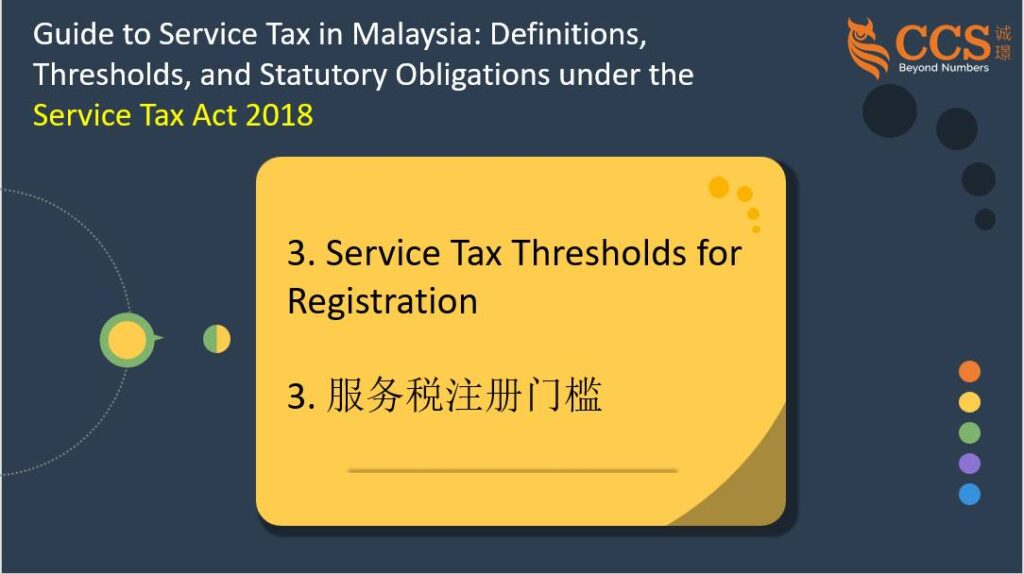
Service Tax Thresholds for Registration
3.1 General Principles for Threshold Determination (Historical and Future Methods)
Any person providing taxable services is legally obligated to register for service tax if the total amount of taxable services provided by them within a 12-month period exceeds a prescribed threshold.
The determination of this 12-month period can be based on two distinct methods, whichever occurs earlier:
- Historical Method: This method assesses liability based on the total value of taxable services for any given month, combined with the value of taxable services for the 11 months immediately preceding that month.
This is a retrospective assessment, looking at actual past performance. - Future Method: This method considers the total value of taxable services for any given month, combined with the value of taxable services for the 11 months immediately succeeding that month.
Liability arises if there are “reasonable grounds to believe” that the threshold will be exceeded within this forward-looking 12-month period.
This necessitates a proactive assessment of future revenue.
The inclusion of both “historical” and “future” methods for threshold determination places a significant and continuous burden on businesses for revenue monitoring and forecasting.
While the historical method offers a straightforward review of past revenue, the future method requires businesses to make forward-looking projections.
This means a business could become liable for registration even before physically hitting the threshold if it is reasonably anticipated that future revenue will cross it within the next year.
This proactive requirement demands continuous, often real-time, tracking of revenue and accurate forecasting, which represents a higher operational and administrative burden compared to a purely retrospective assessment.
3.2 Specific Registration Thresholds by Service Group
While the common registration threshold for most taxable services is RM500,000, specific thresholds apply to certain service groups, reflecting tailored regulatory considerations:
- Food and Beverages (Group B): The threshold for this sector is RM1,500,000.
- Construction Services: A threshold of RM1,500,000 applies to construction services.
- Private Healthcare Services: This sector also has a threshold of RM1,500,000.
- Rental and Leasing Services: This sector also has a threshold of RM1,000,000.
- Private Education Services: For private preschools, primary, and secondary schools, the threshold is based on annual tuition fees exceeding RM60,000 per student.
Notably, higher education institutions and language centres that teach international students are required to register regardless of their turnover, effectively having a “Nil” threshold for this specific segment. - “Nil” Threshold Services: Certain services are subject to a “Nil” threshold, meaning any person providing these services is liable for registration irrespective of their annual turnover.
This applies to credit card and charge card services (Group H) and approved customs agents providing services for the release of goods from customs control.
The application of a “Nil” threshold for specific services like credit/charge card provision and approved customs agents signifies a distinct regulatory intent.
This indicates that these sectors are deemed critical for oversight or revenue collection regardless of their scale of operation.
The absence of a turnover threshold for these categories implies that the government considers them to be of such importance, either for financial regulatory purposes, control over trade, or inherent revenue potential, that even the smallest providers must be registered.
This ensures comprehensive oversight and tax collection from these specific, high-priority sectors.
3.3 Recent Adjustments to Thresholds
![]() In a significant revision announced following widespread public and industry feedback, the Service Tax registration threshold for businesses in the leasing, rental, and financial services sectors was increased from RM500,000 to RM1 million in annual sales, effective July 1, 2025.
In a significant revision announced following widespread public and industry feedback, the Service Tax registration threshold for businesses in the leasing, rental, and financial services sectors was increased from RM500,000 to RM1 million in annual sales, effective July 1, 2025.
This adjustment is anticipated to considerably reduce the number of small businesses required to register for the 8% Service Tax in these newly expanded sectors.
This recent increase in thresholds for specific sectors like leasing, rental, and financial services is a direct consequence of public and industry feedback.
This demonstrates the government’s responsiveness to economic concerns and its effort to balance revenue generation with supporting micro, small, and medium enterprises (MSMEs).
The explicit statement that this move aims to “support micro, small and medium enterprises (MSMEs)” further reinforces that this change is a deliberate measure to alleviate the tax burden on smaller businesses in these newly expanded taxable sectors, showcasing a pragmatic and adaptive approach to fiscal policy.
3. 服务税注册门槛
3.1 门槛确定的一般原则(历史方法与未来方法)
任何提供应税服务的人员,若其在12个月内提供的应税服务总额超过规定的门槛,依法必须注册服务税。
该12个月期间的确定可基于以下两种方法中的较早发生者:
- 历史方法:该方法根据任何给定月份的应税服务总价值,结合该月份前11个月的应税服务价值来确定纳税义务。
这是一种回顾性评估,基于实际过往表现。 - 未来方法:该方法考虑任何给定月份的应税服务总价值,加上该月份之后的11个月的应税服务价值。
如果存在“合理理由相信”在该前瞻性12个月期间内将超过阈值,则产生纳税义务。
这需要对未来收入进行主动评估。
同时采用“历史”和“未来”两种方法确定阈值,将给企业带来持续的收入监控和预测负担。
虽然历史方法可直接审查过去收入,但未来方法要求企业进行前瞻性预测。
这意味着,即使企业尚未实际达到阈值,若合理预期未来收入将在下一年度内超过阈值,仍可能需承担注册义务。
这一主动要求需要持续、甚至实时地跟踪收入并进行准确预测,相较于单纯的回顾性评估,这将带来更高的运营和行政负担。
3.2 按服务类别划分的具体注册阈值
虽然大多数应税服务的通用注册门槛为RM500,000,但某些服务类别适用特定门槛,以反映针对性监管考量:
- 食品和饮料(B类):该行业的门槛为RM1,500,000。
- 建筑服务:建筑服务适用RM1,500,000的门槛。
- 私人医疗服务:该行业同样适用RM1,500,000的阈值。
- 租赁服务:该行业同样适用RM1,000,000的阈值。
- 私人教育服务:对于私立幼儿园、小学及中学,阈值基于每位学生年度学费超过RM60,000。
值得注意的是,无论营业额多少,招收国际学生的高校及语言中心均需注册,该特定领域实质上适用“零”门槛。 - “零”门槛服务:部分服务适用“零”门槛,即无论年度营业额多少,提供该类服务者均需注册。
这适用于信用卡和借记卡服务(H组)以及经批准的海关代理提供货物从海关控制中放行的服务。
对信用卡/借记卡服务和经批准的海关代理等特定服务适用“零”门槛,表明了监管意图的特殊性。
这表明这些行业被视为监管或税收征管的关键领域,无论其经营规模大小。
这些类别未设置营业额门槛,表明政府认为其具有重要性,无论是出于金融监管、贸易管控还是内在税收潜力考虑,即使是最小的服务提供者也必须注册。
这确保了对这些特定高优先级行业的全面监管和税收征管。
3.3 阈值的近期调整
![]() 在广泛征求公众和行业意见后,政府宣布对租赁、租赁和金融服务行业的企业服务税注册阈值进行重大修订,自2025年7月1日起,年销售额阈值从RM500,000上调至RM1,000,000。
在广泛征求公众和行业意见后,政府宣布对租赁、租赁和金融服务行业的企业服务税注册阈值进行重大修订,自2025年7月1日起,年销售额阈值从RM500,000上调至RM1,000,000。
此调整预计将显著减少在这些新扩大的行业中需注册8%服务税的小型企业数量。
租赁、租赁和金融服务等特定行业门槛的近期上调,直接源于公众和行业反馈。
这体现了政府对经济问题的响应,以及在平衡税收收入与支持微型、小型和中型企业(MSMEs)之间的努力。
明确指出此举旨在“支持微型、小型和中型企业(MSMEs)”进一步强化了此次调整是为减轻新纳入征税范围的小型企业税负而采取的刻意措施,彰显了财政政策灵活务实的实施态度。
#看趋势看财税看CCS #马来西亚销售税与服务税 #SST






